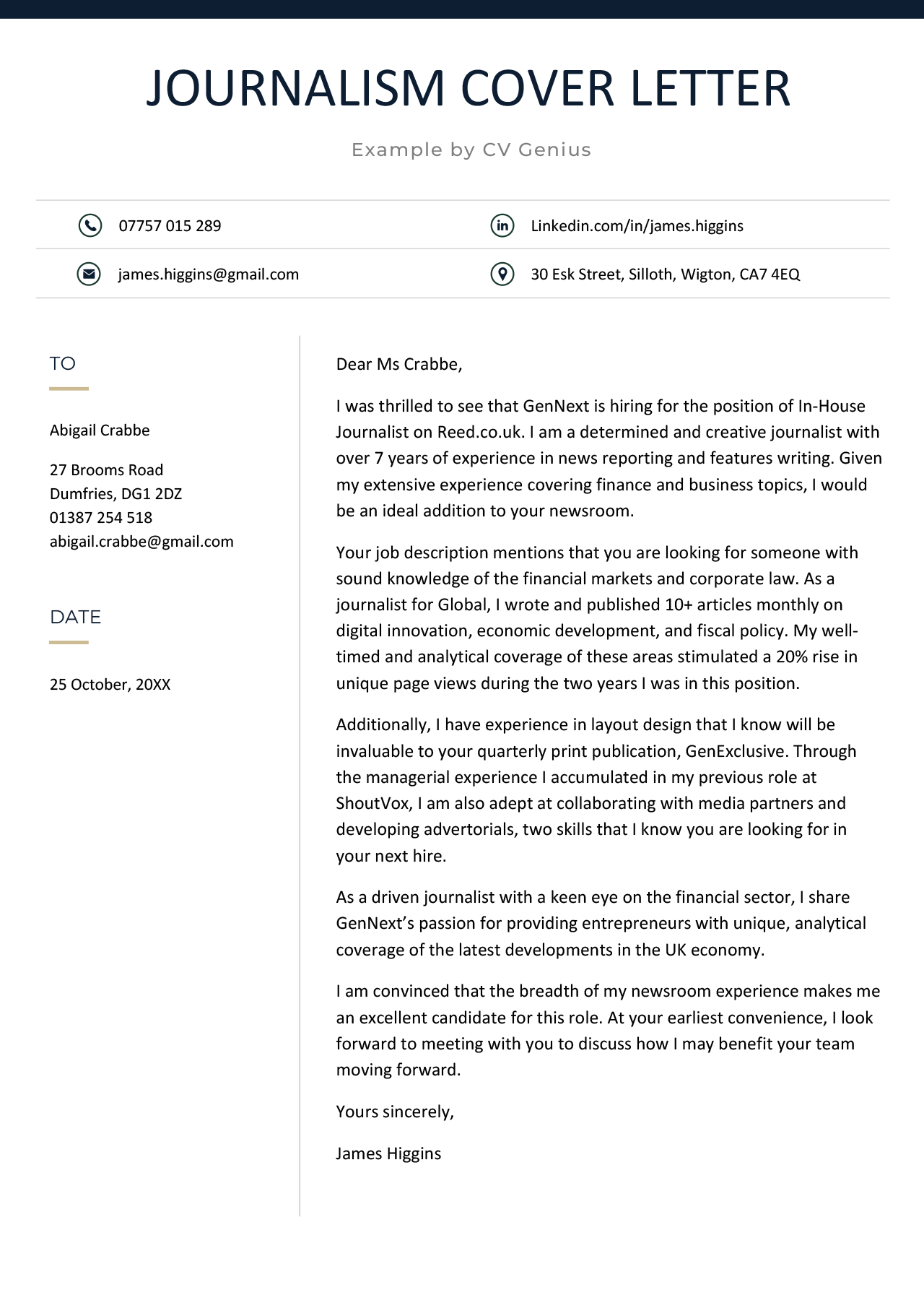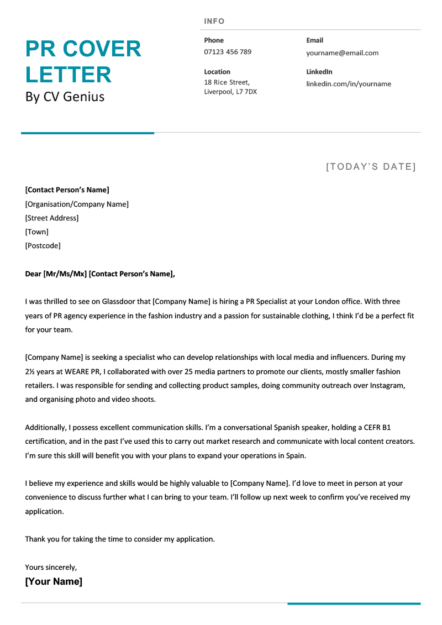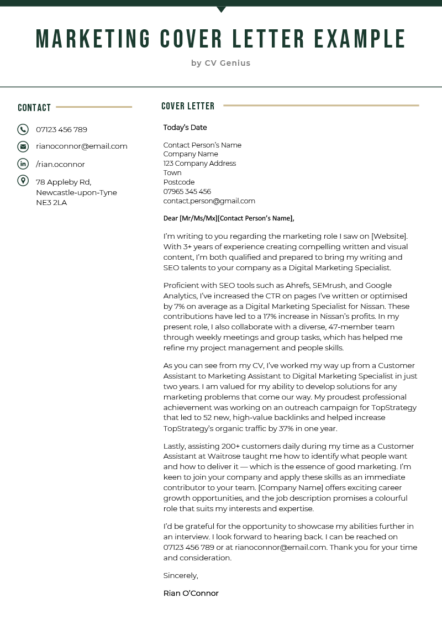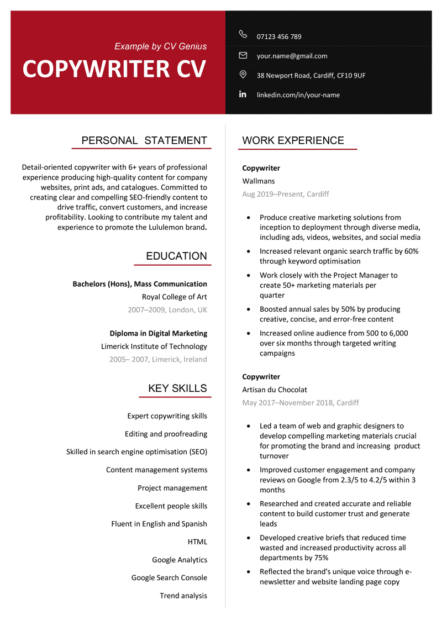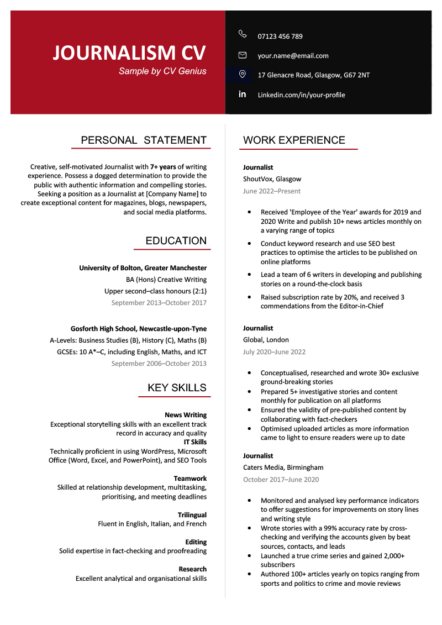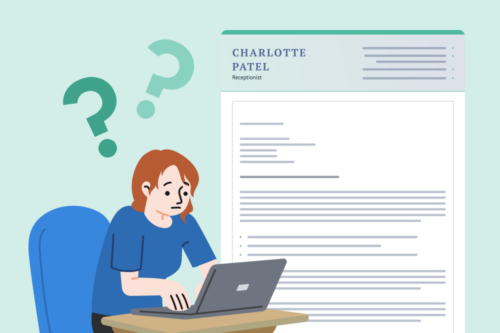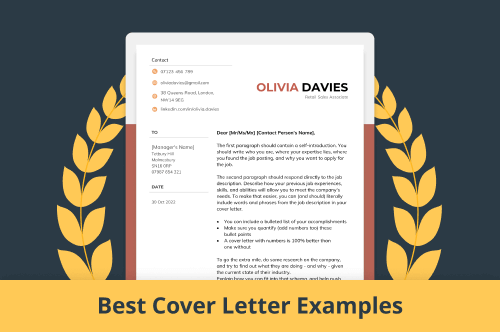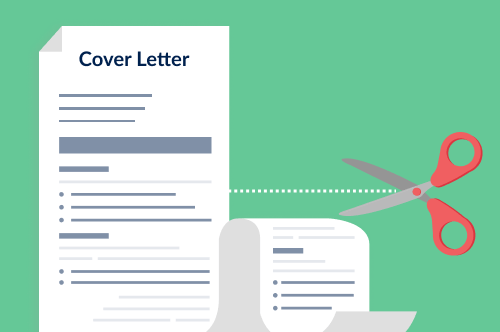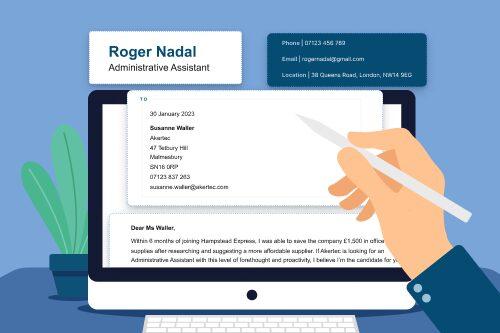Be sure you use the proper cover letter format to make your cover letter readable and professional.
Journalism Cover Letter Template (Text Format)
Today’s Date
Abigail Crabbe
27 Brooms Road
Dumfries
DG1 2DZ
01387 254518
abigail.crabbe@gmail.com
25 October, 2022
Dear Ms Crabbe,
I was thrilled to see that GenNext is hiring for the position of In-House Journalist on Reed.co.uk. I’m a determined and creative journalist with 7+ years of experience in news reporting and features writing. Given my extensive experience covering finance and business topics, I’d be an ideal addition to your newsroom.
Your job description mentions you’re looking for someone with sound knowledge of the financial markets and corporate law. As a journalist for Global, I wrote and published 10+ monthly articles on digital innovation, economic development, and fiscal policy. My well-timed and analytical coverage of these areas stimulated a 20% rise in unique page views during the two years I was in this position.
Additionally, I have experience in layout design that will be invaluable to your quarterly print publication, GenExclusive. Through the managerial experience I accumulated in my previous role at ShoutVox, I’m also adept at collaborating with media partners and developing advertorials, two skills you’re looking for in your next hire.
As a driven journalist with a keen eye on the financial sector, I share GenNext’s passion for providing entrepreneurs with unique, analytical coverage of the latest developments in the UK economy.
I’m convinced that the breadth of my newsroom experience makes me an excellent candidate for this role. At your earliest convenience, I look forward to meeting with you to discuss how I may benefit your team moving forward.
Yours sincerely,
James Higgins
How to write a journalism cover letter
Before you begin writing, make sure you know how to write a cover letter in a way that makes you seem like the best candidate for the job.
If you’re looking to break into the journalism industry, you know how important it is to make a cover letter highlighting your skills and experience.
While exciting and immensely rewarding, journalism is highly competitive, especially for entry-level writers. So whether you’re pursuing a career as a broadcast journalist, newspaper reporter, or magazine writer, you need to know how to pitch your relevant experience and essential skills to hiring editors.
A well-written journalism cover letter is an essential part of selling yourself. Here are three ways you can optimise yours so that it hooks the editor and lands you your dream job.
1. Tailor your cover letter to the company
It’s never a good idea to send out the same cover letter to multiple positions, but it’s especially bad in journalism.
Every publication has its values. Hiring editors will be looking for applicants who share those values and are passionate enough about their subject matter to thrive in an industry that’s both competitive and highly time-sensitive.
One easy way to tailor your application is to learn how to address a cover letter properly by using a contact person’s name (e.g., ‘Dear Ms Johnston,’).
If you already know the basics of how to write a cover letter, you’ll know that it’s important to outline your motivations for applying to the specific job — even if employers will almost certainly ask you the same question at the interview stage.
You should outline your motivations at two points in the cover letter:
- the opening paragraph
- at the end of your letter, right before your closing statement
These are important opportunities to demonstrate a thorough understanding of the role and tell the employer why you want to work for them, not any publication that will have you.
Review the job description and company website, so you’re sure of the company’s exact values, mission, and subject matter.
Perhaps your target company has a focus on local markets. Perhaps it invests heavily in its video journalism team. Identify specific traits and values that align with your career interests and use your journalism cover letter to explain how these have motivated you to apply.

2. Show you’re qualified for the specific role
The purpose of a cover letter is to explain your reasons for applying and relate your experience and skills to the open position.
The contents of your cover letter shouldn’t be a generic description of your skills, education, and work history.
Instead, use your journalism cover letter to demonstrate your suitability for the role by providing an overview of achievements, skills, and qualifications that are highly relevant to the job description.
Most employers look for qualified candidates who won’t need extensive on-the-job training, so your cover letter should outline the traits and achievements they seek.
Review the job description and requirements closely to identify the role’s core competencies. These will likely include interviewing, fact-checking, and storytelling.
Choose three relevant skills you possess and explain how your mastery of them makes you an excellent candidate for the job.
Journalists typically need a number of hard skills (learned, industry-specific skills) and soft skills (personality-related abilities). These include:
Journalism Cover Letter: Hard Skill vs Soft Skills
| Soft Skills | Hard Skills |
|---|---|
| Written and verbal communication | Backend software (e.g. WordPress, Medium) |
| Creativity | SEO |
| Time management | Video editing software (e.g. Premier, Final Cut Pro, After Effects) |
| Interviewing | Excel |
| Analytical skills | Google Analytics |
| Active listening | Newsletter design (e.g. MailChimp) |
| Pitching | Graphic design (e.g. Photoshop) |
| Scripting | Proficiency in news writing |
| Attention to detail | Social media analytics |
3. Quantify your achievements
Numbers make the employer’s job easier by making your cover letter more digestible and easier to scan.
Some numbers you could include in a cover letter for a journalism role are:
- how many articles you’ve written
- the circulation of a publication you’ve written for
- changes in new site metrics (e.g. unique page visits, bounce rate etc.)
Quantifying your achievements will make them stand out to the employer, but only include numbers highly relevant to the hiring company and position.
For example, you might talk about your success in increasing unique page visits if the requirements for the job include SEO skills or proficiency in writing web content. You wouldn’t if the job ad is for a print publication.
Data is a powerful tool for your journalism cover letter, especially if you don’t have a long work history. They can draw attention to your skills and achievements and away from your years of experience.
Number of freelance articles, amateur writing prizes, or personal blog metrics (e.g. page visits or shares and comments) are great figures for entry-level journalists to include — if they demonstrate your suitability for the role.
The same principle applies to your CV. So make a CV that emphasises your accomplishments with percentages, pound amounts, and other hard numbers.
Other Great CVs & Cover Letters from this Industry:
Cover Letters:
